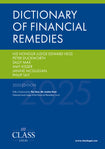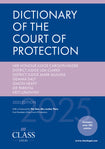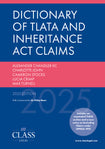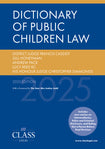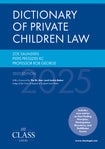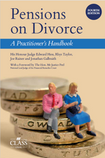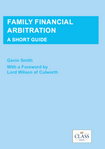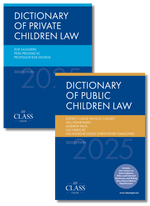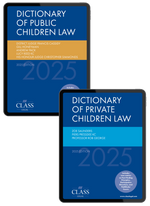PRE-ORDER Dictionary of Private Children Law 2025
Authors: Zoe Saunders, Piers Pressdee KC, & Professor Rob George
Shop and save with bundles
Product Overview
Product Description
The Dictionary of Private Children Law is a unique reference guide to the key concepts, cases, and practice of private children law. Its A4 format and targeted concise content makes it a unique model of accessibility and portability.
Presented in an easy to use A-Z format, with cross references where required, each entry acts like a practice note on the topic setting out the essential law, key cases, and practice points. The book distills the combined experience of the editors with the aim of providing a concise practical handbook focusing on the most important issues and practice points likely to be encountered by anybody involved in a private children law case. The intention is to achieve this aim for judges and practitioners working in the field, but also to provide a book sufficiently accessible for litigants acting without lawyers.
What's new for 2025?
-
Fact-Finding Principles
- Participation Directions
- Pathfinder Courts
Who will find the book useful?
-
Every family law solicitor, barrister or legal executive advising clients on disputes about children after divorce or separation
-
Family Court Judges
-
Mediators, Arbitrators, and other professionals involved in out of court dispute resolution
-
McKenzie Friends and litigants in person
Delivery and shipping information
Delivery is free on orders over £100. Orders can be despatched same day when placed before 1PM Monday to Friday. Orders are not processed or shipped during weekends or holidays.
Delivery fees are not charged on print pre-orders or annual subscriptions of the Financial Remedies Journal as post & packing is included in the item price.
If you have ordered an e-book, you will shortly receive an email with a link to access your book on our bespoke e-reader. There is also a link to access your book on your order confirmation.
If you have any queries, please do not hesitate to contact info@classlegal.com or call our office on 01652 652 222.
Who is this product most suited for?
Author Biography & Information
How does a pre-order work?
Pre-ordering is a fantastic way to get ahead and secure your order before its publication. When you pre-order one of our titles, you will receive the title as soon as it is published. Some of the pre-orders for our titles include an exclusive discount, allowing you to save on the final, full price of the title.
Product Details
-
Publisher
Class Legal
-
ISBN/Ean
Print ISBN: | 978-1-80161-102-2
Digital ISBN: | 978-1-80161-103-9
-
Edition
5th Edition 2025
-
Available Formats
Digital, Print
-
E-Book Compatibility
Class Legal E-reader
-
Published
2025-04-01
-
Country of Origin
United Kingdom
-
Book Language
English
-
Pages
115
-
Dimensions
30 x 21 x 0.5
PRE-ORDER Dictionary of Private Children Law 2025
Authors: Zoe Saunders, Piers Pressdee KC, & Professor Rob George
